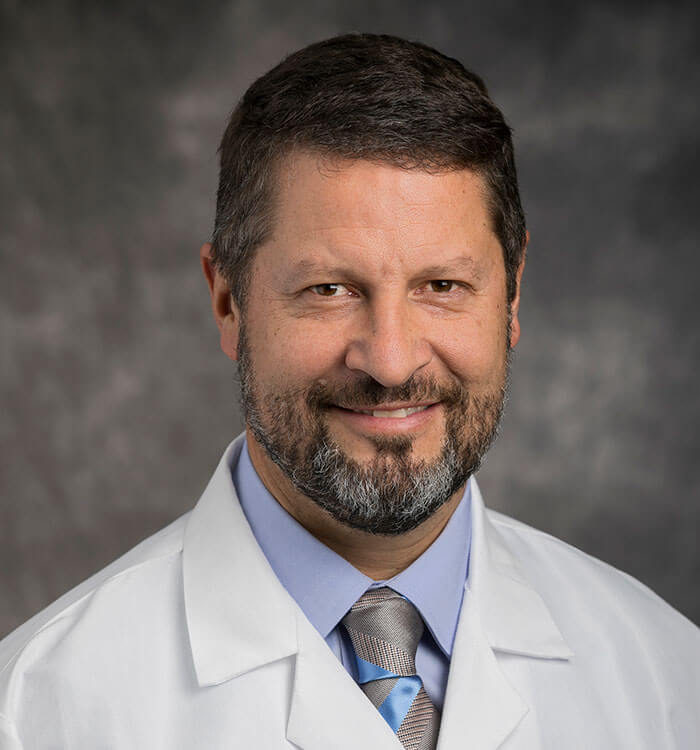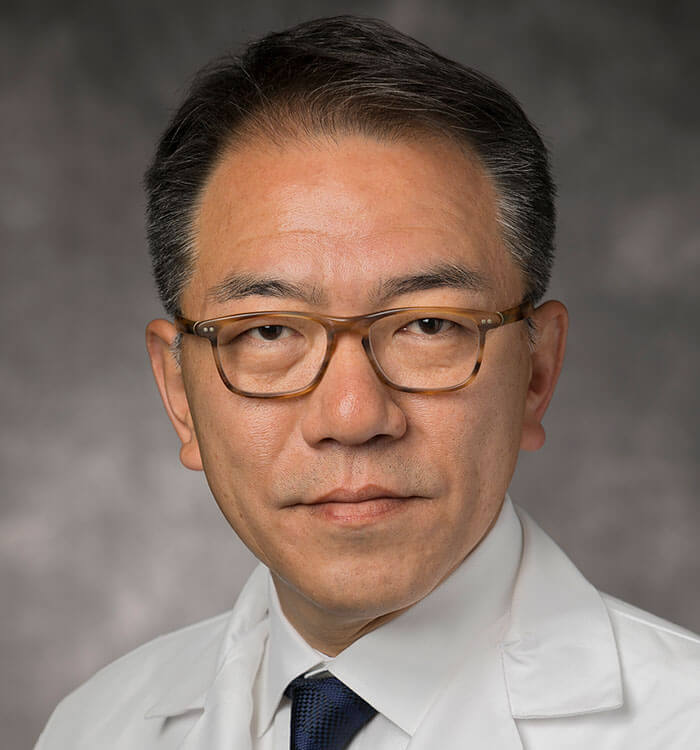New Protocols Advance Treatment of Aortic Disease
July 12, 2022
Innovations in Cardiovascular Medicine & Sugery | Summer 2022
The Aortic Disease Center within University Hospitals Harrington Heart & Vascular Institute offers a complete spectrum of aortic care, from minimally invasive endovascular therapy to full open surgery. Co-directors Cristian Baeza, MD, and Jae Cho, MD, lead a multidisciplinary team of expert surgeons, interventional cardiologists, cardiovascular specialists and geneticists who provide advanced imaging, diagnosis and treatment for acute and chronic aortic disease. Here, they share the center’s recent happenings.
 Cristian Baeza, MD
Cristian Baeza, MD Jae Cho, MD
Jae Cho, MDRapid Transfer and Patient Referral Protocols
Last fall, protocols were established to facilitate the rapid transfer of patients with acute aortic syndrome to the highest level of aortic care within University Hospitals Cleveland Medical Center. “We have streamlined the transfer process for acute aortic catastrophes to ensure patients receive emergency care,” says Dr. Baeza. “Since launching the protocols, the center has experienced a double-digit increase in patient referrals.” Rapid transfer is available throughout the University Hospitals Health System and from outside health systems. Additionally, physicians who want to refer or discuss a patient can connect with the center through a dedicated email, phone line or electronic medical record (EMR) dropdown menu. Referred patients are seen by Dr. Baeza and Dr. Cho in a combined clinic.
ERAS Protocols
The center has also incorporated Enhanced Recovery After Surgery (ERAS) protocols, a continuum of processes that have been shown to improve surgical outcomes. With guidelines for before, during and after surgery, they include patient education, nutrition and medication management. Additionally, patients are awakened and extubated in the operating room when feasible, reducing complications, lengths of stay and discomfort.
Spinal Cord Protection
A well-documented and devastating complication of thoracoabdominal aneurysm surgery is spinal cord ischemia (SCI), which can result in paralysis. Experts within the center have implemented innovative protocols to enhance spinal cord protection. Accessible through EMR, the orders reduce the risk of SCI for patients undergoing aneurysm procedures. These multimodal protocols outline adjunctive therapies shown to be beneficial, including blood pressure parameters, transfusion goals, medication therapy and cerebrospinal fluid drainage.
Identifying Undiagnosed Aneurysm
University Hospitals Harrington Heart & Vascular Institute pioneered no-cost computed tomography (CT) coronary artery calcium (CAC) scoring for patients with defined risk-enhancing factors. CAC scores and other test results are added to CLARIFY, an international longitudinal registry of patients with stable coronary artery disease. Analyzing data from patients who have received CAC at University Hospitals, experts within the center are flagging undiagnosed aortic dilation or aneurysm. “The registry is providing real-time information about a population with no prior evidence of dilation or aneurysm,” says Dr. Baeza. “This is an important breakthrough in identifying an often-latent condition, and we are following these patients carefully to prevent complications.”
Aortic dilation is defined at 4 centimeters and aneurysm at 4.5 centimeters. To date, 8.6 percent of participants in UH’s CAC scoring initiative have been diagnosed with dilation and 0.7 percent with aneurysm. “These incidentally uncovered aneurysms represent a key finding,” says Dr. Cho. “This population was also noted to have higher incidence of hypertension and obesity, so it is essential that they receive proper medication and monitoring.”
Clinical Trials
Dr. Cho is the UH Cleveland Medical Center principal investigator for the TRIOMPHE trial, a multi-center clinical investigation of the NEXUS™ Aortic Arch Stent Graft System (NEXUSTM), approved by the U.S. Food and Drug Administration (FDA) for the treatment of thoracic aortic lesions involving the aortic arch. “We are embarking on several trials for the endovascular treatment of aortic aneurysm, both in the chest and abdomen,” he says. Another randomized trial is also underway to compare the efficacy of the MEDTRONIC® ENDURANT® and the GORE® EXCLUDER® stent grafts.
Physician Modified Endografts
Surgeons within the center are modifying endografts to treat patients with complex thoracoabdominal aneurysms who are not candidates for open surgery. “For these patients, we do a physician modification at UH Cleveland Medical Center because there are no commercially available grafts for this population,” says Dr. Cho.
Citywide Consortium
The center spearheaded the establishment of a citywide consortium of cardiac and vascular surgeons. Experts from University Hospitals Cleveland Medical Center, Cleveland Clinic and the MetroHealth System are invited to gather quarterly to present cases and review breakthrough papers. “This is a great achievement for the center in terms of reaching out to the community to collaborate with our colleagues throughout Cleveland,” says Dr. Baeza.
Physician Recruitment
This November, William Yoon, MD, will join the center. Currently, he serves as clinical director for the aortic program at NorthShore University Health System in Chicago. “Dr. Yoon is a rising star in vascular surgery, and he has expert knowledge in advanced endovascular technology for complex aortic pathologies such as aortic arch and thoracoabdominal aneurysms,” says Dr. Cho. “We look forward to his arrival.”
To learn more or make a referral, contact the Aortic Disease Center at AorticCenter@UHhospitals.org or call 216-220-9910. For emergency transfers, call 216-844-1111.
Contributing Experts:
Cristian Baeza, MD
Co-Director, Aortic Disease Center
University Hospitals Harrington Heart & Vascular Institute
Assistant Professor
Case Western Reserve University School of Medicine
Jae Cho, MD
Co-Director, Aortic Disease Center and Interim Chief, Division of Vascular Surgery & Endovascular Therapies
University Hospitals Harrington Heart & Vascular Institute
Professor
Case Western Reserve University School of Medicine


